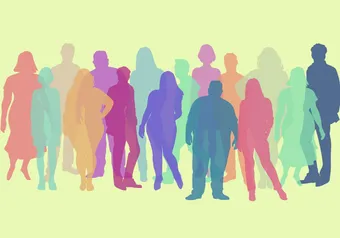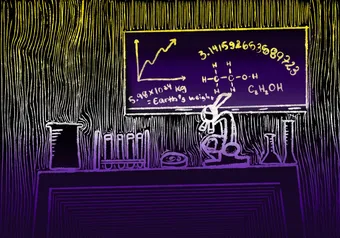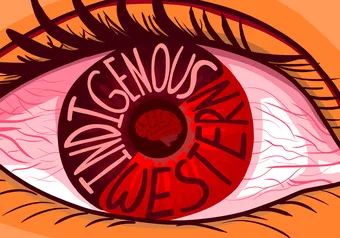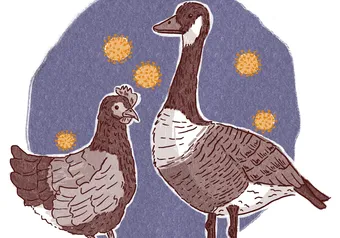2016 was a great year for science.
Gravity waves were detected for the first time, NASA's Juno spacecraft reached Jupiter, a possible new ninth planet was observed and Earth's closest neighbouring star — Proxima Centauri — was found to have a possibly habitable planet orbiting it.
A new Ebola vaccine was shown to be effective and a bird flew through lasers with goggles. Experiments on astronaut twins Mark and Scott Kelly could help scientists and engineers plan for a trip to mars or beyond.
A new prime number was discovered and SpaceX landed a rocket on a boat. Cybernetic implants helped a paralyzed man move his fingers. Earth's second moon was discovered. Four new names were officially added to the periodic table of elements.
[Sorry, video not found. You can contact webmaster@ubyssey.ca to fix the issue]
The discoveries, inventions and ideas from the past year hold the promise to continue to improve lives around the world, create a more just and equitable future, and grow humanity's collective knowledge about the world around us.
The discoveries of science in 2016 are truly incredible and hold unimaginable promise.
But 2016 was a very, very bad, no good, terrible year for science too.
The US elected a president who denies basic scientific knowledge, instead claiming climate change is a Chinese hoax (it's not), that vaccines are associated with autism (there is no, nor has there ever been, evidence for this) and believes you can't really know what's “going on” in the age of computers.
The US House Committee on Science, Space and Technology — the committee that oversees NASA, the Department of Energy, the National Science Foundation, the Environmental Protection Agency, the National Oceanic and Atmospheric Administration, the Agency for Toxic Substances and Disease Registry, FAA, the National Institute of Standards and Technology, and FEMA — tweeted an article by Breitbart that unscientifically denied climate change.
Think it's only a US problem? You're wrong. Whooping cough, a vaccine-preventable disease, broke out across Canada due (at least partially) to low vaccination rates. Just last month, we covered a story about low vaccination rates in Vancouver.
.@BreitbartNews: Global Temperatures Plunge. Icy Silence from Climate Alarmists https://t.co/uLUPW4o93V
— Sci,Space,&Tech Cmte (@HouseScience) December 1, 2016
It's been just over a year since Canada had a prime minister who muzzled scientists for political purposes. Thirty-nine per cent of Canadians don't believe the scientific truth that climate change is caused by humans. The same 2015 study (link in French) showed 40 per cent of Canadians don't believe the science is clear on vaccines. Canadians aged 18–35 have the highest rates of believing vaccines have a real risk of serious side effects and the lowest rates of believing they are effective against disease.
Science needs to learn to communicate.
Since about World War II, scientists have relied almost exclusively on government grants to fund their research. The only people they needed to convince of the value of their work was the government bureaucracy that fed them (taxpayer) dollars to buy equipment, pay salaries and conduct research. Generations of scientists have forgotten how to present their work to the public, the very people who have been indirectly funding their work and the very people scientists' work is supposed to help.
[Sorry, video not found. You can contact webmaster@ubyssey.ca to fix the issue]
More than anything else in 2016, science learned it had to communicate. The question is, have scientists?
Scientists must learn to communicate effectively to the public if we hope to feed the world's population, protect it from emerging and existing diseases, stop the dramatic climb in opioid addiction, educate tomorrow's leaders and thinkers, slow global climate change and have a healthy, livable planet.
Sounds a bit overdramatic, right? Just look at 2016 — people are rejecting science, expertise and “elitism” left and right. And science is to blame. It has hidden in its shell for far too long and must now poke its head back into the big, scary, “post-truth” world we appear to be moving towards, and fight for its existence and importance.
The good news is the fight is far from over, and science can still ensure the public supports and understands science and its value to society and democracy. Universities can foster a culture of scientific outreach and public engagement. Governments can require scientists to be civically engaged to receive research grants. Research institutes can hire and pay science communicators and advocates. Schools can teach science communication and its importance.
UBC has flirted with the idea of incorporating communication into its research infrastructure. Professors like Dr. David Ng and Dr. Jennifer Gardy (full disclosure: she's my degree mentor) spend a fair bit of their time and energy doing communication and outreach. UBC research groups like RES’EAU WaterNET do public consultations as an integral part of their business model. The faculty of science even has a course on science communication.
UBC needs to do more than flirt with communication. UBC, you need to encourage all research professors to engage with the public, teach all science and engineering undergrads to communicate with the public and advocate for science and hire communicators and outreach workers to bring science to Vancouver, BC and beyond.
If UBC truly wants to be a world leader in research, it must be an innovator in disseminating its research to the public.
The science of 2016 holds unimaginable potential for improving our world. Without an engaged public, it could all amount to absolutely nothing.
Science needs to learn how to communicate science. UBC can help teach it.
First online
Share this article








